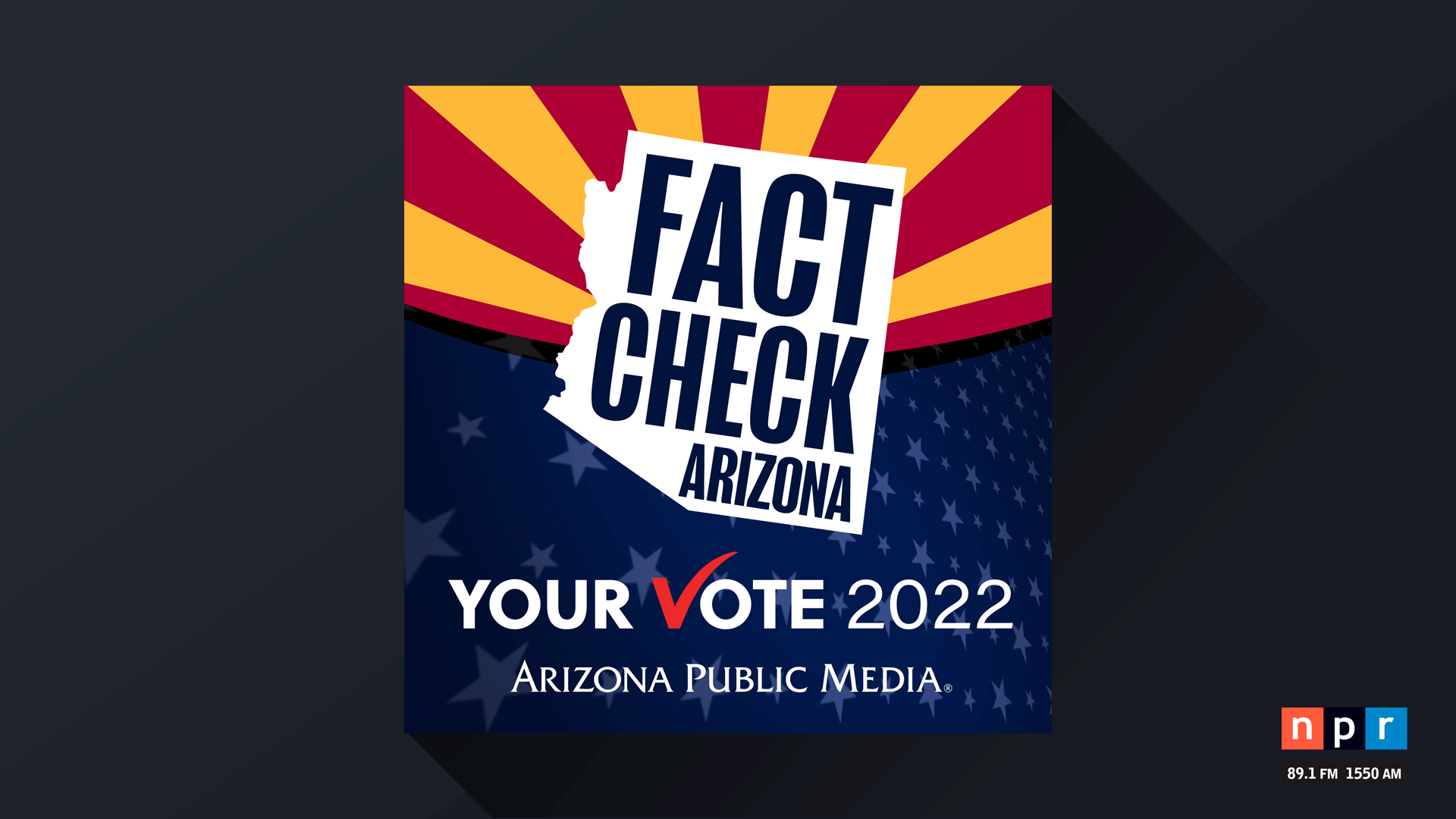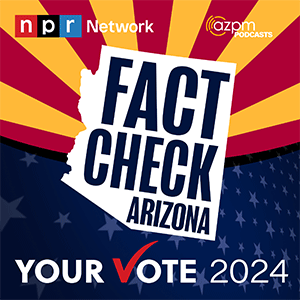 The Fact Check Arizona podcast will cover the 2022 Arizona election season.
The Fact Check Arizona podcast will cover the 2022 Arizona election season.
Fact Check AZ: Ep. 3

When Katie Hobbs and Kari Lake appeared on CBS' Face the Nation, the topic that received the most time was the U.S. Mexico border and immigration.
More than a third of the roughly 18 minutes that the two candidates were on the program was spent on the topic, taking more time than abortion, election civility and integrity, the economy and a debate that never happened.
Hobbs' platform, both as presented on the program and on her campaign website hinge on the federal government, with blame placed on both sides.
"Trump centered his whole immigration policy around finishing the wall, and it's not done. But Biden does need to step up on immigration and border security, absolutely," she said on her Face the Nation appearance. "Arizona is bearing the brunt of illegal drug trafficking, gun trafficking and smuggling, and we do need more border security."
Hobbs' plan for moves by the State of Arizona include more funds and assistance for "border community sheriffs and law enforcement." She also mentions more funds for community centers and hospitals that deal heavily with migrants and asylum seekers.
Beyond that, the site lists a wide range of ideas that Hobbs would lobby and advise the federal government on.
Lynn Marcus, a Clinical Law professor and Director of the Community Immigration Law Placement Clinic at the University of Arizona said that plan make sense since federal courts have told states, including Arizona, that they lack the authority to enforce immigration law.
“In the 90s, there were lawsuits by the states. There was a tremendous rise in state legislation to try to control immigration. And in the Arizona v U.S. case, back in 2012, ten years ago, the Supreme Court ruled the supremacy clause of the constitution means that the federal government has broad powers over immigration law enforcement and states don’t.”
Arizona v. the United States was a case that involved SB 1070, which among other things, required state law enforcement try to determine someone's immigration status
Marcus said that the biggest effect that Arizonans can have on how the federal government handles immigration is how we vote when it comes to congressional representatives.
Kari Lake takes a more aggressive approach on how to deal with the federal government when it comes to immigration and border security.
"Of course, if you know the Constitution you know that Article 4, Section 4 calls for the federal government to protect us from invasion and under Joe Biden's lack of leadership, we just aren't seeing that, and we have an invasion at our border," Lake said during her appearance on Face the Nation. "The cartels, these narco-terrorist groups have operational control and they're using Arizona to smuggle people, to traffic children and to traffic the most dangerous drug we've ever seen, fentanyl."
Fentanyl is a growing problem at the Arizona/Mexico border. It is the only drug that has seen seizures in Arizona rise each year since 2019, though its seizures still make up less than a third of the top drug seized at the border by weight, methamphetamine.
U.S. Customs and Border Protection does not publish statistics on the number of human smuggling stops at the border.
Article 4, Section 4 of the U.S. Constitution is frequently referred to as the Guarantee Clause. It states:
"The United States shall guarantee to every State in this Union a Republican Form of Government, and shall protect each of them against Invasion; and on Application of the Legislature, or of the Executive (when the Legislature cannot be convened) against domestic Violence."
Marcus said that the use of the term invasion has historically required certain criteria.
"There are limited circumstances in which states can declare an invasion under the Constitution, and that's when there's been an invasion by a foreign power and the federal government has not come to the state's protection."
This was not the only instance where Lake quoted the constitution during her interview.
"And so we're going to invoke our Article 1, Section 10 basically authority to take care of our own border and protect our own border. It's right there in black and white in the Constitution, and we meet all three criteria: we have an invasion, our people are in imminent danger and time is of the essence. There's no time for delay."
Article 1, Section 10 states:
"No State shall, without the Consent of Congress, lay any Duty of Tonnage, keep Troops, or Ships of War in time of Peace, enter into any Agreement or Compact with another State, or with a foreign Power, or engage in War, unless actually invaded, or in such imminent Danger as will not admit of delay.
Lake specifically engages with three notions from that passage when she calls the crisis an invasion, states that Arizonans are in imminent danger and that time is of the essence.
Marcus said that the passage addresses a specific issue in order to prevent states from engaging in items that would interfere with the country's diplomatic efforts.
“The Constitution puts the authority to declare war in the hands of Congress, not the hands of the state. And essentially when a state is declaring invasion it is declaring war.”
She also said that the matter has traditionally been called a political one, which has kept it out of the federal courts.
"The 9th Circuit Federal Court which, is the court that covers our region, Arizona and California included, ruled in 1997 that this is really a political question, that the courts can't get involved in. The courts can't decide when there's been an invasion and when there hasn't. It's up to the federal government to decide this because there's really no manageable standards to determine when it is and when it isn't, and this has been the agreement of other circuit courts as well. All the federal courts that have looked at this question have ruled the same way."
And, while the U.S. Supreme Court has recently undone precedent and stare decisis in Dobbs v. Jackson, Marcus notes that decision hinged on an originalist stance.
"The court [went] back to the time of the constitutional amendments and what was the intent. If you’re doing that and you are looking at when the Constitution was written. When these articles were drafted, you have to look at the Federalist Papers, which is what the federal courts have [gone to] in saying that what we are talking about is an invasion from a foreign power a foreign nation.” And she notes that James Madison's writings on the matter in the Federalist Papers take a stance that a foreign power must be involved for an invasion to be declared.
And, while a Mexican drug cartel may be a large criminal enterprise, it is not a foreign power, and its illicit activities in the U.S. does not constitute an invasion from Mexico.
Marcus said she is worried that talk of an invasion is allowing one side to gloss over the humanitarian crisis that is at the border and its legal implications.
"The United States as part of international law treaties that we have signed onto and also our federal law has some humanitarian protections because basically the values of most Americans include protecting men, women and children from being persecuted, and we have the right our laws establish the right not to be sent back to a country where a person is tortured, not to be sent to place were a person is going to be persecuted.”



By submitting your comments, you hereby give AZPM the right to post your comments and potentially use them in any other form of media operated by this institution.